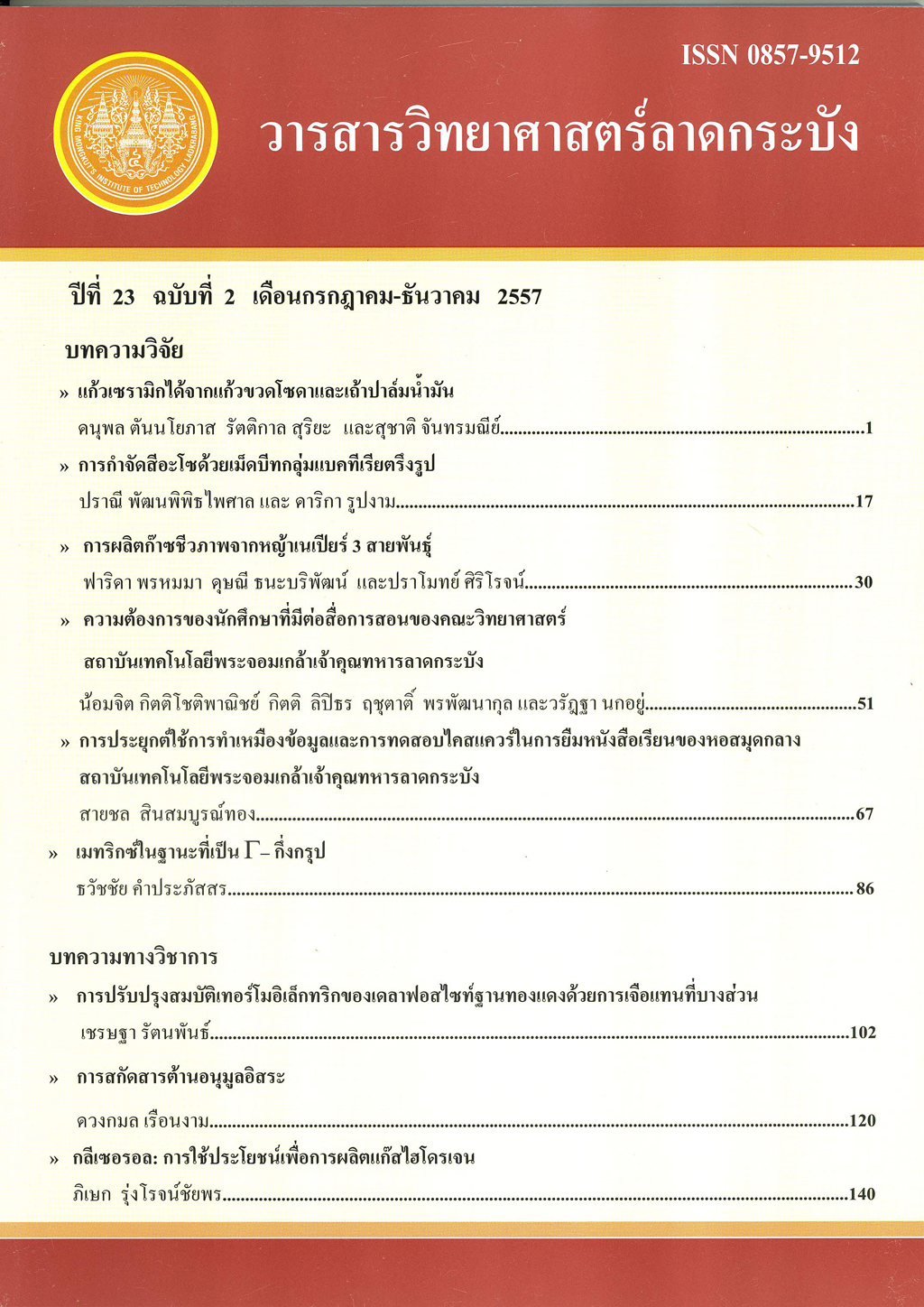กลีเซอรอล: การใช้ประโยชน์เพื่อการผลิตแก๊สไฮโดรเจน
Main Article Content
Abstract
บทคัดย่อ
กลีเซอรอลดิบที่เป็นผลพลอยได้จากกระบวนการผลิตไบโอดีเซลนับวันจะมีปริมาณเพิ่มมากขึ้น เนื่องมาจากความต้องการของการใช้พลังงานเชื้อเพลิงที่สูงขึ้น หากมีการทิ้งกลีเซอรอลดิบลงในแหล่งน้ำหรือดิน อาจส่งผลให้เกิดมลพิษกับสิ่งแวดล้อม ดังนั้นควรจะนำกลีเซอรอลดิบที่เกิดขึ้นจำนวนมากมาใช้ประโยชน์ไม่ทางตรงหรือทางอ้อม หรือควรจะถูกนำมาดัดแปลงหรือปรับปรุง เพื่อเพิ่มมูลค่าด้วยการเปลี่ยนให้เป็นสารใหม่ที่มีมูลค่าสูง และไม่เป็นมลพิษต่อสิ่งแวดล้อม การเปลี่ยนกลีเซอรอลให้เป็นเชื้อเพลิงชีวภาพ เช่น ไฮโดรเจน เอทานอล หรือ มีเทน จึงเป็นสิ่งซึ่งน่าสนใจในการช่วยลดมลพิษที่จะเกิดกับสิ่งแวดล้อม อีกทั้งยังเป็นการเพิ่มมูลค่าและทำให้เกิดการใช้ประโยชน์จากกลีเซอรอล เพื่อให้สามารถใช้เป็นแหล่งพลังงานทางเลือกในอนาคต โดยบทความนี้ได้รวบรวมข้อมูลจากวารสารวิชาการที่เกี่ยวข้องกับกระบวนการต่าง ๆ ที่ใช้ในกระบวนการผลิตแก๊สไฮโดรเจนจากกลีเซอรอล เช่น กระบวนการโฟโต แคตาไลซิส (Photocatalysis) การรีฟอร์มมิงด้วยไอน้ำ (Steam reforming) กระบวนการออกซิเดชันบางส่วน (Partial oxidation) กระบวนการออโตเทอร์มอลรีฟอร์มมิง (Autothermal reforming) กระบวนการเอเควียสเฟสรีฟอร์มมิง (Aqueous-phase reforming) กระบวนการซุปเปอร์คริติครัลวอร์เตอร์รีฟอร์มมิง (Supercritical water reforming) กระบวนการเปลี่ยนแปลงทางชีวเคมี (Biochemical conversion process) เป็นต้น
คำสำคัญ : กลีเซอรอล, ไบโอดีเซล, ไฮโดรเจน, โฟโตแคตาไลซิส, รีฟอร์มมิงด้วยไอน้ำ, เอเควียสเฟสรีฟอร์มมิง, ซุปเปอร์คริติครัลวอร์เตอร์รีฟอร์มมิง, กระบวนการเปลี่ยนแปลงทางชีวเคมี
Abstract
Crude glycerol, a byproduct from the biodiesel production process, has increased substantially in recent years. This is due to higher of the fuel consumption demand. If the crude glycerol is dumped into natural sources without any treatment, it could cause pollution to the environment. Thus the tremendous amount of produced glycerol should be utilized either directly or indirectly. Otherwise it should be modified or upgraded to increase their values. Therefore added value of the crude glycerol by transforming them into new compounds such as hydrogen, ethanol or methane is highly interesting and it is also very attractive to reduce pollution to the environment. In addition, the glycerol could be used as an alternative energy source in the future. This article had reviewed several journals that related to the production of the hydrogen processes from glycerol, i.e., Photocatalysis, Steam reforming, Partial oxidation, Autothermal reforming, Aqueous-phase reforming, Supercritical water reforming, Biochemical conversion process etc.
Keywords: Glycerol, Biodiesel, Hydrogen, Photocatalysis, Steam reforming, Partial oxidation, Autothermal reforming, Aqueous-phase reforming, Supercritical water reforming, Biochemical conversion process

